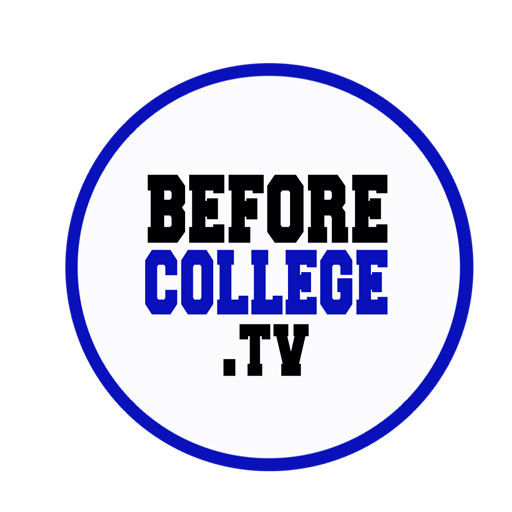ONE OF YOUR PEOPLE PROJECT | UNIVERSITY OF IOWA
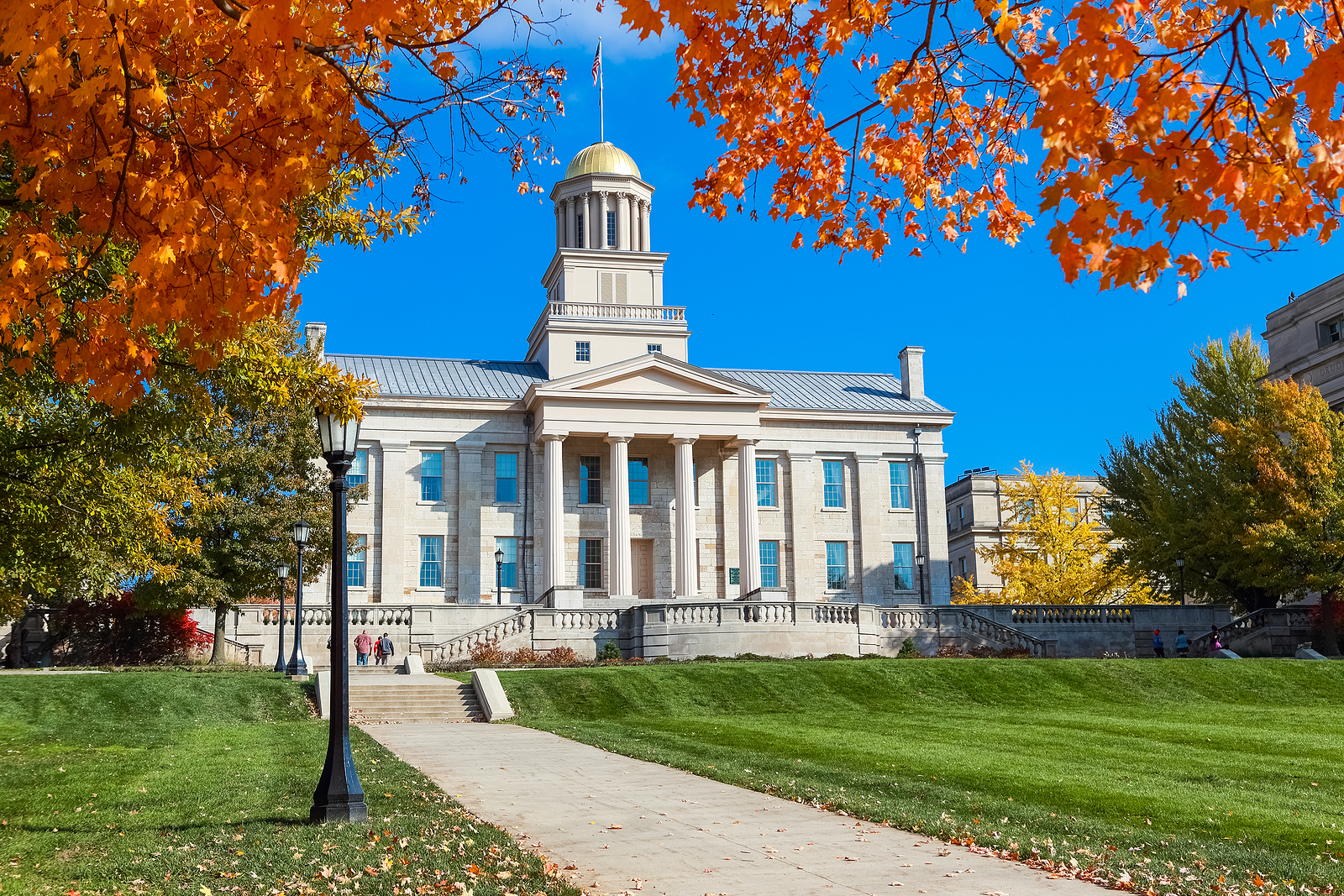
University of Iowa (Iowa City, Iowa)
Undergraduate Population: 23,410 total
U.S. Department of College Scorecard: Graduation rate, majors, costs, salaries
Official Website: https://uiowa.edu/
Social Media: Facebook | Twitter | Instagram | YouTube | Snapchat | LinkedIn | TikTok
College Newspaper: Daily Iowan
QUICK CLIPS: Highlights from First-Generation Student Conversation
Emily struggled in the classroom and reached out to get help...
Karter had a hard time transitioning to life in college...
Raquel shares why this professor made her feel comfortable in class...
How Elizabeth found a mentor and community on campus...
The College Panel
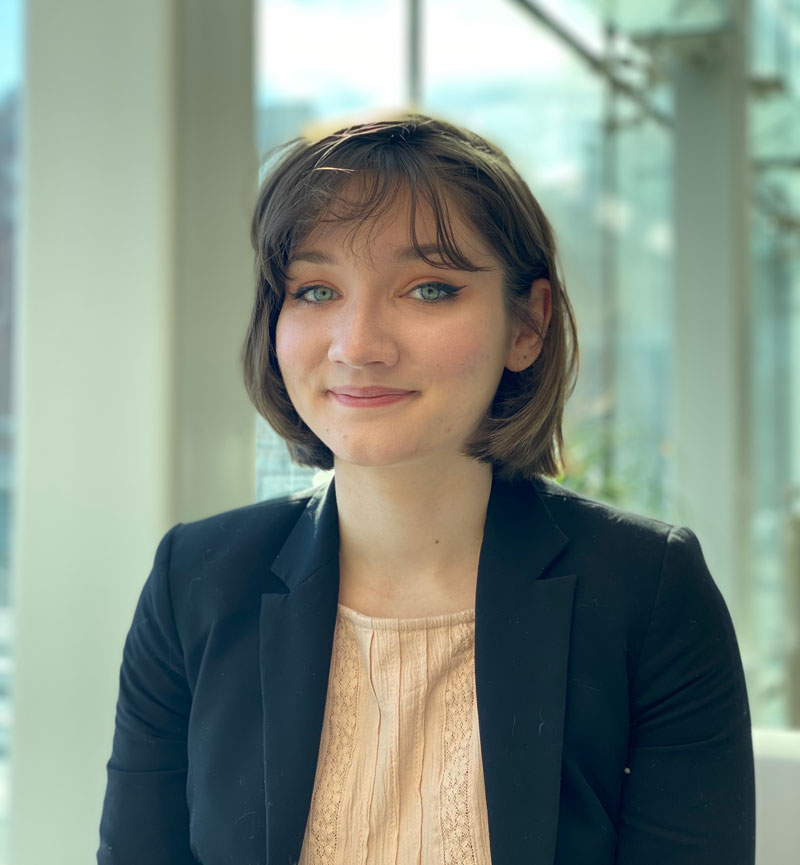
Elizabeth Folkers
Hometown: Des Moines, Iowa
High School: North High School
Year in College: Class of 2021
Major: Ethics & Public Policy (with a self-designed specialization in Sexuality & Gender in Social Systems), Spanish; Latina/o/x Studies minor; pre-law
Elizabeth’s Places at U of Iowa: alpha Kappa Delta Phi International Sorority, Inc. - University of Iowa Associate Chapter, Multicultural Greek Council (MGC), TRIO Student Support Services, Center for Diversity and Enrichment (CDE), Cultural Centers, Asian Pacific American Cultural Center (APACC) programming (e.g. AAPI (Asian American Pacific Islander) Book Club), Salsa Club, Iowa City Salsa Practice Group (ICSPG), Phi Alpha Delta Pre-Law Fraternity, Cafecito Cervantes (Spanish conversation group), University Concert Band, Iowa N.E.W. Leadership (women's leadership conference), LeaderShape
High School Places: Gender Sexuality Alliance, Girls Basketball, Band (Marching Band, Concert Band, Jazz Band), Des Moines Youth Symphony Orchestra, Wellmark Blue Cross and Blue Shield Beacon Internship, Polar Bear Crew (student government & freshman orientation team)
First Generation Student: Yes
Reach out to Elizabeth by email: efolkers2@gmail.com
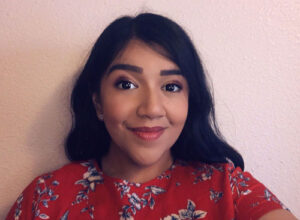
Emily Rodriguez
Hometown: West Liberty, Iowa
High school: West Liberty High School
Year in college: 2023
Major: Secondary Education/ Mathematics (Minor: Latino Studies)
Emily’s Places: ALMA: Association of Latinos Moving Ahead (freshman year) Walk It Out, Iowa Edge: *Has my whole heart*
High School Places: Volleyball - Soccer (varsity and Jv team captain) - Student council (president) - Interact club (vice President) - National honors society - Upward bound - Honor Choir - Choir - Show choir
First Generation Student: Yes
Reach out to Emily on Instagram: @_emi.rodriguez_
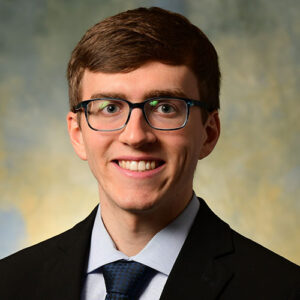
Karter Donahue
Hometown: Cedar Rapids, IA
High School: Kennedy High School
Year in College: Class of 2022
Major: Business Analytics and Information Systems
Karter’s Places: Dance Marathon: A student-led nonprofit organization that aims to raise money to fight pediatric cancer at the UI Stead Family Children’s Hospital, Delta Sigma Pi Business Fraternity: Professional organization for business students. Residence Halls: It was so great living on campus with so many other first-year students. My residence hall is where I met many of my friends freshman year. Classes, especially First-Year Seminars: Classes were a great way to meet new people, especially in the classes that align with the major you plan to pursue
High School Places: Student Government, Golf, National Honor Society
First Generation Student: Yes
Reach out to Karter: by email at karter-donahue@uiowa.edu or connect with him on LinkedIn!
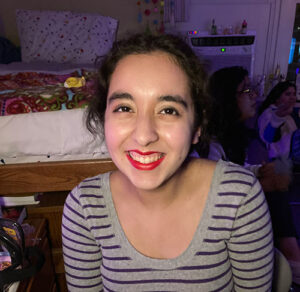
Raquel Valladolid
Hometown: Sioux City, IA
High School: North High School
Year in College: 2024
Major: Spanish and English and Creative Writing
Raquel’s Places: ALMA: Association of Latinos Moving Ahead - organization for students in the Latina/o/x community to strengthen bonds and provide resources. Translate Iowa Project (TIP): this group meets every week to create a publication called Boundless, where we take students' submissions and translate them into different languages. I specialize in Spanish translation. English Society: a fun space for people who love writing. My favorite meetings are the Niche Powerpoint events.
High School Places: concert and marching band, orchestra, Writing Club, tennis, National Honor Society, Quiz Bowl
First Generation Student: Yes
Reach out to Raquel on Instagram: @rvalladolid20
FULL COLLEGE CONVERSATION
TRANSCRIPT FROM COLLEGE CONVERSATION
Hashtag Directory: #WhoIs #highschool #background #TRIO #GEARUP #dreamjob #applyingtocollege #rejection #scholarships #studentsupport #firstgen #payingforcollege #studentloans #makingfriends #communterstudent #getinvolved #transition #gettinghelp #mentalhealth #uncomfortableexperience #people #places #advice #academicstruggle #greeklife #campusjob
7:58 Harlan asks Emily about what her dream in high school was and what her dream is now. She used to want to be a doctor but now she wants to become a teacher. #dreamjob
9:40 Harlan asks Karter about what he was like in high school. He was always active. He is pretty social and college was always in the plan despite him not being the best planner. #WhoIs #highschool #background
11:35 Harlan asks Raquel about what she was like in high school. She says she was kind of everywhere. She was usually in the music hallway, all the band kids gravitated to the same spot. She played 3 instruments in school, flute, piccolo, and viola in orchestra. College was always in her plan as well. Her parents really pushed for college. She is a freshman at Iowa now. #WhoIs #highschool #background
13:30 Harlan asks Elizabeth about what she was like in high school. She is a senior in college now. She was very involved as well and was in the band. She was a co leader in the gender/sexuality group. Band was the biggest thing for her. #WhoIs #highschool #background
15:21 Harlan asks Emily about what she was like in high school. She says she was known for always being the smiley one. She was always trying to lift spirits and support the teams etc. She always wanted to go to college and knew she had to try hard to get there. She is the second youngest of 4 kids. Her brother went to college but dropped out sophomore year. Her sister obtained an associates degree. #WhoIs #highschool #background
18:06 Harlan asks Raquel what her dream is. She says she doesn’t know what her dream really is yet. She is studying a few different things now. She figures she may not be in one job for the rest of her life. She is studying Spanish, English and creative writing, as well as education. So, she might get a job in one of those fields. She talks about not knowing anyone personally who is doing what she wants to do so she doesn’t quite have role models to talk to and ask questions. She wants to be a book editor. Harlan mentions he can connect her with someone through his publisher. Share your dreams and something will happen. #dreamjob
22:28 Harlan asks Elizabeth about her dream. She knew she wanted to do something in the legal field. She did an internship in high school. She also knew she wanted to do something in immigration law. A lot of her friends in high school had experiences with being undocumented or having a different status. So that is her area of interest. Harlan has her continue her answer cleanly. She wants to take a gap year and work for a while then go to law school. #dreamjob
24:44 Harlan asks Karter what his dream is. He says he doesn’t have anything specific in mind. He would like to make an impact in some way and do something meaningful. He is involved on campus in a few ways. #dreamjob
26:19 Harlan asks Emily what the greatest challenge she faced was as a first gen student applying to college. Even though she had two older siblings that had gone through the process before, they had their own lives at that point and couldn’t help. The first difficult moment was attending the FAFSA night alone without her parents and having lots of questions, what do I write about? What do I need to include for scholarship applications? How do i fill out these forms etc. There were lots of other students in a similar situation and they gathered together. She mentions some counselors and teachers that helped her. Her mom couldn’t attend because she was working to support the family. She remembers seeing other kids with their parents who only spoke Spanish, so she was able to walk around and help them. Emily was also part of the upward bound program. They helped her with ACT prep and scholarships. They also helped with FAFSA questions. She was working as a waitress in her hometown at the same time. She ended up having a mental breakdown and went to the hospital for 2 weeks because she was so overloaded. #firstgen #applyingtocollege
32:34 Karter shares his experience as a first gen student applying to college. He had always planned on University of Iowa, being from only 30 minutes away. He didn’t really run into many issues on the journey to college. Difficulties only arose for him after arriving. He seemed to be having a more difficult time than a lot of his peers were and he couldn’t figure out why. For example during the first couple of weeks he couldn’t figure out how to pay his U Bill. He tried asking roommates but no one else was dealing with the money, their family was taking care of it. Karter had financial responsibility that no one else seemed to have. He remembers a particular night when a lot of school work was piling up with a lot of other things going on in life like work and student organizations he was trying to get involved with. He walked out to the student lounge to try and take a breather and he was overcome with stress. He remembers a friend of his from high school who was also there and saw something was up, she came up and talked things out with him. That sort of set the tone for him that he can get through tough times. Karter reflects on how he found friends. He would take every opportunity he could to meet new people like saying yes whenever anyone wanted to play frisbee in the park. #firstgen #transition
39:43 Raquel describes the challenges she faced on her journey to college as a first gen student. She also has an older sister who went to college. She observed how she struggled when she first went to college. She was very isolated at first. Seeing that, made Raquel paranoid. So that drove her to really research a lot about deadlines and applications etc. She talks about confusion that arose while trying to apply to other schools, not understanding the websites. Her parents didn’t understand much about the college application process. The Trio program at her high school was very helpful, they helped with her FAFSA. Harlan asks if she has found people at U of Iowa that she can turn to. She says her advisors are nice and Angie in the office of academic support and retention. She connected with her through the GEAR UP program. She says she’s adjusting, sometimes scared of missing deadlines. She tries to just focus on what’s important in the moment and not worry about “what ifs.” Most teachers are making it easy to find deadlines for assignments. Harlan asks if it’s scary to talk to professors. She says it’s safe. #firstgen #applyingtocollege #TRIO
46:58 Elizabeth talks about her journey to college and the difficulties she experienced as a first gen student. She also experienced some difficulties with timelines and deadlines and knowing when to do which steps, such as when to research schools, do the tests, tour schools etc. She was only just touring schools during her senior year when applications were due. She didn’t know much about other schools outside the midwest. She found out about a women’s college in California she would’ve been interested in, but the deadline was right when she found out about the school. Now that she’s looking at going to law school, she is exploring places like Texas, California and Hawaii. #firstgen #applyingtocollege
51:14 Harlan asks Elizabeth, who is now a senior, what it was like when she was a freshman trying to get involved. She had a bunch of set expectations for herself. She did music in high school so she learned a lot about discipline. She wrote things down, and listed what goals she wanted to set. She wanted to get straight As, and get involved with the concert band. She set the goal to go to office hours once a week and turn homework in on time. She explored using the campus resources like the writing center. Having that goal oriented mindset really helped. She joined TRIO during her 2nd semester and that made her feel more supported. Harlan asks how she even knew to look for these resources. He asks Karter if he knew about those resources, he said no. Elizabeth says orientation helped a lot by exposing her to a lot of opportunities to get help. The syllabi of her classes also listed things like the writing center. #transition #getinvolved #places
1:00:17 Elizabeth talks more about TRIO. She explains that you can get tutoring, free printing and mentorship if you fit the criteria. She mentions her trio coach Cassie as one of her primary supports in college. Harlan asks her to expand on why Cassie is such a great coach. Elizabeth says she's so supportive, she recalls crying in her office when she was having a hard time and she helped her through it.
#studentsupport #TRIO #people
1:03:09 Harlan asks Emily about TRIO. She was involved with Upward Bound, which is more of the high school side of things.
1:04:24 Karter talks about his familiarity with TRIO. He now works in the department of academic support and retention. He wasn’t aware of the programs during his freshman year. #TRIO #studentsupport
1:06:27 Harlan asks Karter where he found his people and “places” on campus. He says his support group since he was a freshman continues to be his friends. He points out one friend who is from his hometown, though they didn’t go to the same school. They really click well. Both their parents came from the same small town which meant they had a lot in common with how they were brought up. #people #makingfriends
1:08:37 Harlan asks Raquel how GEAR UP helped her. She was surprised it started over the summer. With COVID shutting everything down, she didn’t get orientation. Over the summer she was in a program that had different modules on studying tips. She didn’t study much in high school much, she didn’t really need to. So she had to learn how to study for the first time. There was a scholarship incentive to finish the program. She’s apprehensive about attending orientation next year when in-person activities should return. #GEARUP #transition
1:11:44 Harlan asks Emily about academic struggles and how she got through it. She struggled a lot with chemistry and math for biological sciences. She was on scholarship and had to maintain good grades to keep it. She was afraid she would be on academic probation. She talked to her mentors and they showed her how to get tutors for those classes. She met with them twice a week. She was trying to prepare for midterms. She would go to office hours and stayed after class as well as attended supplementary instruction. She didn’t get an A but she was able to pass those classes. #academicstruggle
1:14:11 Harlan asks Emily how she found her mentors. She was in TRIO so she already knew Hailey, from high school. She moved on to being her mentor through college as well. One time she was unavailable so she met another mentor Cody who offered to be of help if Emily was ever having a tough time. #TRIO #people
1:16:00 Harlan asks Elizabeth about her academic struggles. She mentioned she had a goal of getting straight As her freshman year. She did actually get straight As her first semester, but after that it wasn’t so easy. She has a terrible tendency towards procrastination. All of her classes assign long papers that all end up being due at the same time so that is very bad news for someone that procrastinates. #academicstruggle
1:17:32 Harlan polls the group asking who is currently working while at school. Everyone says they have a job. Karter has a few jobs, working 25 hours a week. He is a tour guide, does food delivery, and works in the academic support and retention office. At one point he was on payroll for 5 jobs. He says he stays on top of things by staying very organized. He also recognizes the importance of communication and being open with his managers about his work load and class requirements. He says he doesn’t really ask professors for extensions or to be forgiving of late work. He doesn’t expect he’ll get special treatment on that side. He tries his best to get everything done on time even if that means having to compromise on the level of quality in his work.
#campusjob #payingforcollege
1:23:08 Harlan asks Emily if she is working a lot too. She is working one job but it varies. Sometimes it’s 20, 30, 40 hours a week. She works in a make up store and enjoys it a lot.
1:24:00 Harlan asks Raquel about work. She just recently got a job. She thinks having a job helps her a lot. Having too much freedom causes her to procrastinate. Having a commitment like a job helps her to manage her time better.
1:25:04 Harlan asks the panel about other challenges they faced as first gen students. Emily says she had scheduled calculus into her class load this semester. She felt like she was really stressed so it might be better to not go into calculus after all. She didn’t know about withdrawing from a class. Would she have to pay for it? Etc. She had no idea. Then she talked to her advisor who explained that students withdraw from classes all the time. She will opt to take the class over the summer even though there are some compromises to doing that. Karter says that he also has withdrawn from classes. He expresses the relief he felt from being able to click a button and not have to worry about the workload from the classes that were causing a lot of trouble and stress for him. One was a computer science class that was just an elective, he wasn’t part of the CS program. His advisor told him he could withdraw.
#academicstruggle #uncomfortableexperience
1:30:07 Harlan asks the students about people they want to mention that have helped them at school. Raquel points out Jorge Guerra, the Latinx studies dept. She says the way he teaches makes it so easy to feel at home and with community. She says the way he teaches includes him sharing a lot of his own experiences. He makes it easy for the students to share and open up. She mentions a conversation she had in his class about struggling with identity. Jorge shared how his mother is from Guatemala, and he was raised in LA, there’s this divide and not feeling that you’re 100% fully a part of one culture or the other, and the family dynamics that go with that. Emily also took a class with Jorge. She echoes Raquel’s sentiments. Jorge is great at relating to the students and shows that he loves what he teaches. He feels like an older sibling.#people
1:33:57 Harlan asks if there’s anyone else that had an impact on the panelists. Karter mentions Ken Brown the associate dean of the college of business. When karter came to college he didn’t understand the hierarchy of the admins. Karter got to know him over the past year. He has helped him get more connected within the university. Karter got to know him though working with Tippy Senate. But even students who aren't in the senate feel that he is approachable. He has been a great mentor for Karter. He admires how Ken prioritizes getting to know students. #people
1:38:23 Harlan asks Emily to talk about how she’s been able to maintain mental health in college. She mentions she almost had the same breakdown her freshman year as she did in high school. She realized she didn’t know how to breathe and calm herself when having a panic attack. She talked to university counseling services and they helped a lot. Angela Lamb was very important in helping her. She helped her push through and not drop out. #people
1:41:04 Harlan asks the panel how many people have had panic attacks. Everyone says yes they have experienced them. Raquel says she did a presentation in high school, where she polled the audience asking who had experienced panic attacks and many more people raised their hands than she expected. Karter says he thinks most people don’t talk about it which is why it seems so shocking when so many people reveal that they struggle with it. #mentalhealth
1:44:24 Harlan asks if anyone wants to revisit any topics. Raquel says she wants to mention her family and that they really have been there to support her especially during her breakdowns. #people
1:45:43 Elizabeth mentions that her sorority has been a great source of support. Her sisters are all first gen/low income. Elizabeth is part of the multicultural greek council, which is focused on sororities and fraternities that are focused around different identity groups. She likes how close knit a lot of those groups are. Through Trio she was introduced to someone who would become her sorority sister. #greeklife #people #places
1:50:11 Raquel shares what it’s like being a first year student during the pandemic. She started out on campus but left due to the climbing infection rates. Now she’s back on campus. She was concerned about making friends since people aren’t really able to go out and mingle. She applied to be in a latinx living and learning community and that has been a great source of community and connection for her. #transition #people #places
1:53:06 Harlan asks Raquel if she can list other places that first gen students can get involved and find community on campus. She says there are many LLCs for all different interests and identities.There is a first gen specific LLC in addition to ones focused around your field of study. There are lots of cultural student orgs you can get involved with. #firstgen #getinvolved
1:55:21 Harlan asks how commuter students can find connection on campus. Emily says she started commuting during the beginning of COVID last year. She said it was difficult, especially with work. She is a peer leader with Iowa edge. That extra time spent driving, especially when the weather is bad, makes it more difficult to go to campus and be as involved as she’d like. #getinvolved #commuterstudent
1:57:47 Harlan asks the panelists what they would tell their high school selves
1:58:14 Harlan asks Karter what he would tell his 9th grade self. He would tell himself to set some actual goals, they don’t have to be anything defining, just having direction and purpose. When he first got to college he was sort of just riding the wave. #advice
1:59:57 Harlan asks Emily what she would tell her 9th grade self. She says she’d give herself a hug, tell herself she was going to be okay. She remembers having a hard time. #advice
2:00:45 Harlan asks Raquel what she would say to her 9th grade self. She would tell herself that things are going to get better, that she doesn’t have to worry so much about everything, that not everyone is looking at the same details she is all the time. #advice
2:01:44 Harlan asks Elizabeth, since she is a senior in college now, what she would tell her 9th grade self and what advice she would give her college freshman self. She would tell herself that the journey is a good journey. She doesn’t regret anything that has happened in HS or college. She would tell her freshman college self to be open to embracing change. #advice
ABOUT THE ONE OF YOUR PEOPLE PROJECT
New York Times bestselling author Harlan Cohen talks with current and recent students about life in college. For more videos visit BeforeCollegeTV on YouTube. For more information about Harlan Cohen visit him online at: www.HarlanCohen.com or follow him on social media: Facebook | Instagram | Twitter | Tik Tok | LinkedIn | Snapchat (helpmeharlan).
DISCLAIMER: All views expressed by panelists and participants are their own and are in no way endorsed, officially affiliated, or representative of the institution, Harlan Cohen, or BeforeCollegeTV. All views expressed on panelists social media are not endorsed or affiliated with Harlan Cohen and BeforeCollegeTV. Students views, opinions, and advice are their own. ALWAYS contact official representatives to verify and validate any information provided
